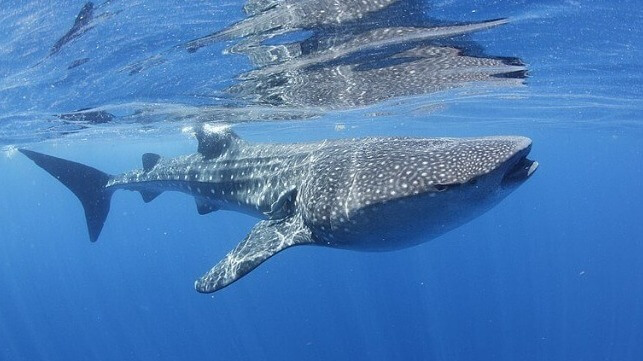Study: Shipping May Bear Responsibility for Decline of the Whale Shark

The commercial shipping industry faces new criticism for ship strike incidents involving whale sharks, which have been declared endangered due to a massive decline in their numbers.
A new study by marine biologists from the Marine Biological Association (MBA) of the United Kingdom and the University of Southampton suggests that shipping may be leading to a large number of whale shark deaths across the world.
According to the study, lethal collisions of whale sharks with large ships are vastly underestimated because previously there was no way of monitoring the threat, and could be the reason why populations of the slow-moving sharks are falling at an unprecedented rate.
“The maritime shipping industry that allows us to source a variety of everyday products from all over the world may be causing the decline of whale sharks, which are a hugely important species in our oceans,” said Freya Womersley, University of Southampton PhD Researcher.
The numbers of whale sharks (Rhincodon typus), the world’s largest living fish, have more than halved over the last eight decades, although it has not been entirely clear why this has been happening. The whale shark is listed as “endangered” by the International Union for the Conservation of Nature Red List.
The study suggests that because whale sharks spend a large amount of time in surface waters and gather in coastal regions, collisions with ships could be causing substantial deaths.
The conclusion was arrived at after scientists from 50 international research institutions and universities tracked the movements of both whale sharks and ships across the globe to identify areas of risk and possible collisions. Satellite tracked movement data from nearly 350 whale sharks was submitted to the Global Shark Movement Project, led by researchers from the MBA.
The team mapped shark "hotspots" that overlapped with movements of cargo, tanker, passenger, and fishing vessels, revealing that over 90 percent of whale shark movements are within the footprint of commercial shipping activity. 92 percent of the sharks’ horizontal space use and nearly 50 percent of vertical space use overlaps with waters frequented by commercial vessels.
The tracker showed that collision-risk estimates correlated with reported whale shark mortality from ship strikes, indicating higher mortality in areas with greatest overlap. Hotspots of potential collision risk were found in all major oceans, primarily from run-ins with cargo and tanker vessels. The hotspots were particularly concentrated in gulf regions, where dense traffic overlaps with seasonal shark movements.
Nearly a third of whale shark hotspots overlapped with the highest collision-risk areas, with the last known locations of tracked sharks coinciding with busier shipping routes more often than expected.
The study also showed that whale shark tag transmissions were ending more often in busy shipping lanes than expected, even when they ruled out technical failures. The team concluded that loss of transmissions was likely due to whale sharks being struck, killed and sinking to the ocean floor.
“For endangered marine megafauna with low population sizes that are slow-moving and occupy surface waters in heavily trafficked areas, fatal collisions may be the primary factor preventing population recovery,” noted the study.
Whale sharks are slow-moving ocean giants which can grow up to 20 meters in length. They help regulate the ocean’s plankton levels, playing an important role in the marine food web and healthy ocean ecosystems.

that matters most
Get the latest maritime news delivered to your inbox daily.
Considering that presently there are no international regulations to protect whale sharks against ship collisions, the research team believes the species faces an uncertain future if action is not taken soon.
“It is sad to think that many deaths of these incredible animals have occurred globally due to ships without us even knowing to take preventative measures,” said Prof. David Sims, Founder of the Global Shark Movement Project.
